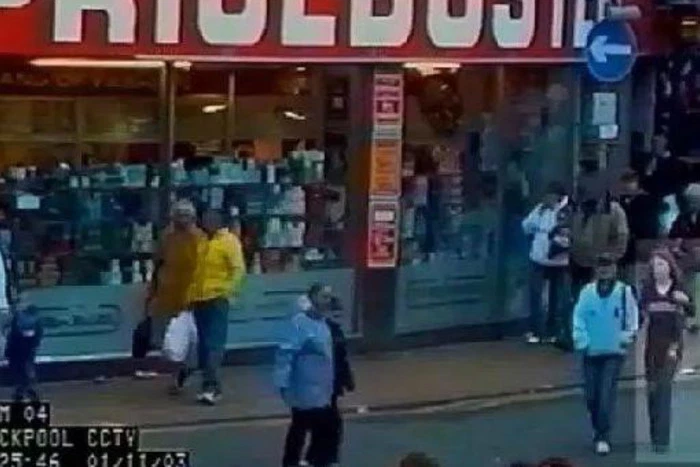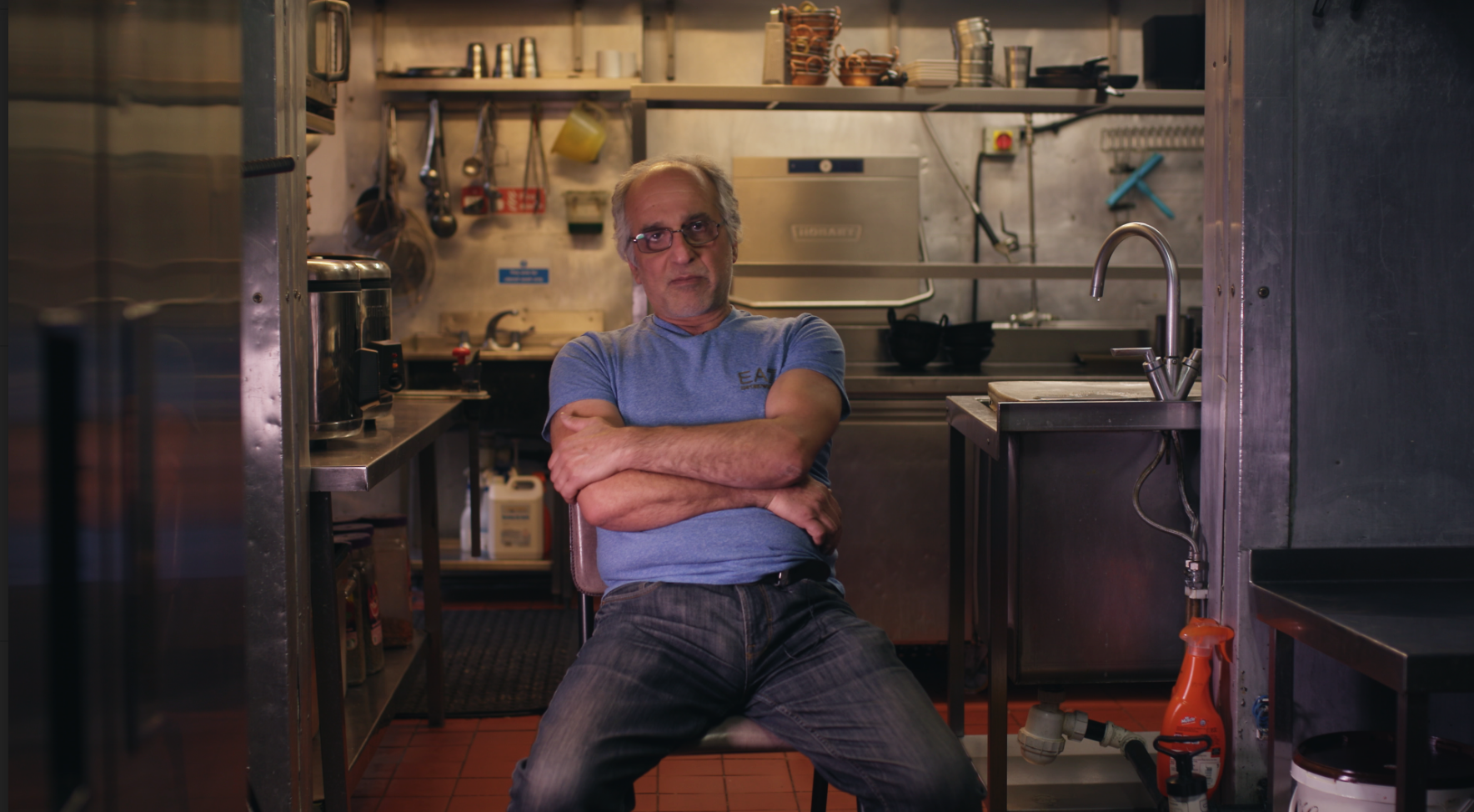VICE U.K. originally published this article.
Though her body has never been found, Charlene Downes haunts the town of Blackpool in England. Ask a local their thoughts on the then 14-year-old's disappearance and they'll respond with anger. Sometimes this anger is racist in tone, sometimes it's not—but it's always intense. It's the kind of anger that borders on dangerous. It's been stoked over the years by misinformation and rumor, fertilized by inertia and cowardice, co-opted for malevolent agendas that have nothing to do with justice.
Born in 1989, vanished on Saturday, November 1, 2003, Charlene Downes has now been missing for over 15 years. Her disappearance remains Lancashire Police's most high-profile missing person inquiry.
Charlene lived on Buchanan Street, in the Talbot electoral division of Blackpool, with her parents, Karen and Robert Downes. She had two sisters, loved the pop group Westlife, and was a fan of Darren Day (the actor-turned-singer even appealed for information at the time of her disappearance). The Downes family had moved from the West Midlands in 1999 when Charlene was 10.
The last time Karen Downes saw her daughter, Charlene was walking toward the Winter Gardens Academy, the town's famous elementary school. She was with her sister, Rebecca; they'd been to the Promenade, eaten at McDonald's, and played at Coral Island. It was a Saturday, but ever since she'd been excluded from school, Charlene had frequented these places a lot. Around 6:45 p.m. that day, Charlene decided to meet some friends, so she called them from a phone booth on Leopold Road. Rebecca went home. Charlene waited with her mom until her friends arrived. She gave her a kiss. "I won’t be late…"
When she went missing, Charlene was wearing black jeans with a design of a gold eagle on the front, as well as a black sweater with a white diamond design and black boots. To the rest of the world she'll be wearing a school uniform forever; that's what she's got on in the photo that picture editors normally drop into stories about her disappearance.

At around 8:30 p.m., on the evening she disappeared, Charlene met another friend. Together, they visited the Carousel Bar on the North Pier. At 9 p.m., a girl can be seen on CCTV at the junction of a main road that leads from the North Pier to the town center, situated on the junction of Dickson Road and Talbot Road. It's believed Charlene is the girl on the tape. She's with a woman believed to be in her 30s. The woman—who has blonde hair and a three-quarter length coat—has never been identified.
Charlene's friend says they left the Carousel Bar around 10 p.m. and went back to the town center. The last time she saw her was an hour later, in the vicinity of Talbot Road and Abingdon Street. This was the last confirmed sighting of Charlene Downes.
Charlene's disappearance wasn’t treated as a murder inquiry until 2006, when two men were arrested on suspicion of her murder and a third in connection with her disappearance. The two men accused were 29-year-old Iyad Albattikhi, originally from Jordan and the owner of the local Funny Boyz restaurant on Dickson Road, and his business partner Mohammed Reveshi, a 49-year-old former Iranian army sergeant and landlord of 42 properties. The former was accused of having sex with the schoolgirl. The latter with disposing of her body. The evidence appeared damming.
The Blackpool Gazette reported that the jury at the 2007 trial was told that police had bugged Reveshi's home. On the tapes, Albattikhi was heard jovially explaining that Downes' body had been "chopped up" and "gone into the kebabs," while Reveshi was recorded saying, "I just cannot forgive myself." On another recording, Albattikhi was heard asking about how long fingerprints last, to which Reveshi responds reassuringly, saying, "There is nothing left of her. She was here, she died, there really is nothing."
The two men had both previously told police they'd never met Charlene. At the time of his trial, Albattikhi was facing a rape trial, subsequently dropped. The jury had been told of 10 separate incidents involving Albattikhi and Reveshi and girls aged between 13 and 15.
However, the jury failed to reach a verdict. A retrial was set for 2008, though in the time that passed senior police officers raised objections to the surveillance evidence. The Independent Police Complaints Commission (IPCC) and Crown Prosecution Service (CPS) were informed. The CPS found no evidence against the two men and the trial was called off. Both men were paid £250,000 [$315,336] each in compensation. One of the men's lawyers accused the police of "incompetence, manipulation, and lies."

The IPCC spent the following 18 months investigating. They deduced that the informant—the man who lived in the house police had bugged—had failed to be briefed correctly. That officers who had worked on the case were "inexperienced and untrained." That the conversations between Albattikhi and Reveshi hadn't been transcribed properly. The detective responsible for that job, Sergeant Jan Beasant, was ordered to resign following the conclusion of the investigation.
A week after the trial collapsed, Karen Downes stabbed her husband with a kitchen knife. "Our family is in meltdown," she told police. In a subsequent interview with the Guardian, she said, "I found out that Charlene was getting chips for a blow job. How can those bastards do that to kids?"
A police report—that was compiled in 2007, but only came to light in 2011—stated that "young people were being groomed and sexually assaulted both inside and outside of premises [in Blackpool] by a number of store owners and workers." The youngest was 11. Most, like Charlene, were aged between 13 and 15. The Daily Mail reported the total number of victims to be "at least 60," and explained that they were offered "food, alcohol, and cigarettes in return for sexual favors." Eleven stores were implicated. Another of the town's teenage girls, 15-year-old Paige Chivers, went missing in 2007. She has also never been found.
Most of the abuse occurred in a location distastefully known to the girls as "Paki Ally," situated between Talbot Road and Clifton Street. Children from foster homes or with unhappy home lives were deemed to be the most at risk. In the specific case of Charlene Downes, it was later revealed that the Downes family had been known to child protection agencies in Coventry and Walsall, before moving to Blackpool, who cited "continued child protection concerns." A convicted pedophile, Ray Munro—who Charlene's father had met while drinking—was living with the family at the time of Charlene’s disappearance.
In an excellent piece written by journalist Andrew Norfolk and published in the Times in 2011, a former senior Lancashire police officer explained that the report hadn't been promoted because the force had "concerns about upsetting community cohesion." Blackpool, it should be noted, is estimated to be around 96 percent white. The journalist Julie Bindel—these days better known for her divisive views on trans issues—wrote about the story extensively at the time, including an expose for the Guardian entitled "Beyond the Pleasure Beach." She has said she would have broken the story earlier, but for newspaper editors concerned their publications would be viewed as racist if they ran her articles.
"The first time I went to Blackpool was when Charlene had just gone missing," says Bindel now. "I cried all the way home. Charlene was a girl that was failed in life—but has also been in death."
"I also discovered," she continues, "that the police appeared to be scared to investigate the grooming gangs. Blackpool is a tough town... the police are no snowflakes—but there was fear on their part of fulling a race war in the town. People like Nick Griffin and Tommy Robinson were there fanning the flames of anger among local people. It had become about race and not justice for Charlene. [The police] just needed to make it clear that the majority of child sexual abusers and pimps in the UK are white men. Child abusers abuse children not because they’re from a particular ethnicity or religion, but because they’re child abusers."
Bindel is right. As Andrew Norfolk wrote in his Times article, "Most child-sex offenders in Britain are white males, usually acting alone. In a random sample of 269 individual cases in which the internet was used to lure and groom victims, more than 95 percent of the convicted offenders were white men aged from 18 to 70."
Unwittingly, Charlene has become a popular promotional tool for the British right-wing in the years since her death. Find a Twitter profile with the national flag of the United Kingdom in the bio, and somewhere between the words "Rotherham" and "7/7" on the timeline, her name will normally be found. The BNP even filmed interviews with Karen Downes on the Blackpool seafront for their YouTube series BNP TV. "No one else has been doing anything to help us," said Karen Downes. Frustratingly, she might have a point—where the police have let Charlene’s case fall away, racist British nationalists continue to exploit it to stoke division.
Justice for Charlene Downes looks a long way off. In 2013, a full-time senior officer was appointed to oversee the case. In 2016, a cold case team reviewed it and discovered CCTV footage of Charlene’s last known steps. Then, last year, a 51-year-old man—who'd been an initial suspect in Charlene’s disappearance the year she’d gone missing—was arrested. This brought the total number of men arrested on suspicion of Charlene’s murder to five. All have been freed without charge.
Unsettling revelations continue to drip out. The new VICE Studios-produced three-part documentary, The Murder of Charlene Downes—available to watch in full on Channel 5 now—recently broke the news that, upon Charlene's disappearance, Karen Downes waited two days to report her daughter missing to police.
Police have stated they believe that Charlene Downes was abused by as many as a hundred men prior to her death, but appear no closer to finding her killer. Surely this 14-year-old schoolgirl—a child who was let down continually throughout her life—deserves better than this in death.
Sign up for our newsletter to get the best of VICE delivered to your inbox daily.
Follow James McMahon on Twitter.
This article originally appeared on VICE UK.
from VICE http://bit.ly/2JVdnBd
via cheap web hosting
No comments:
Post a Comment